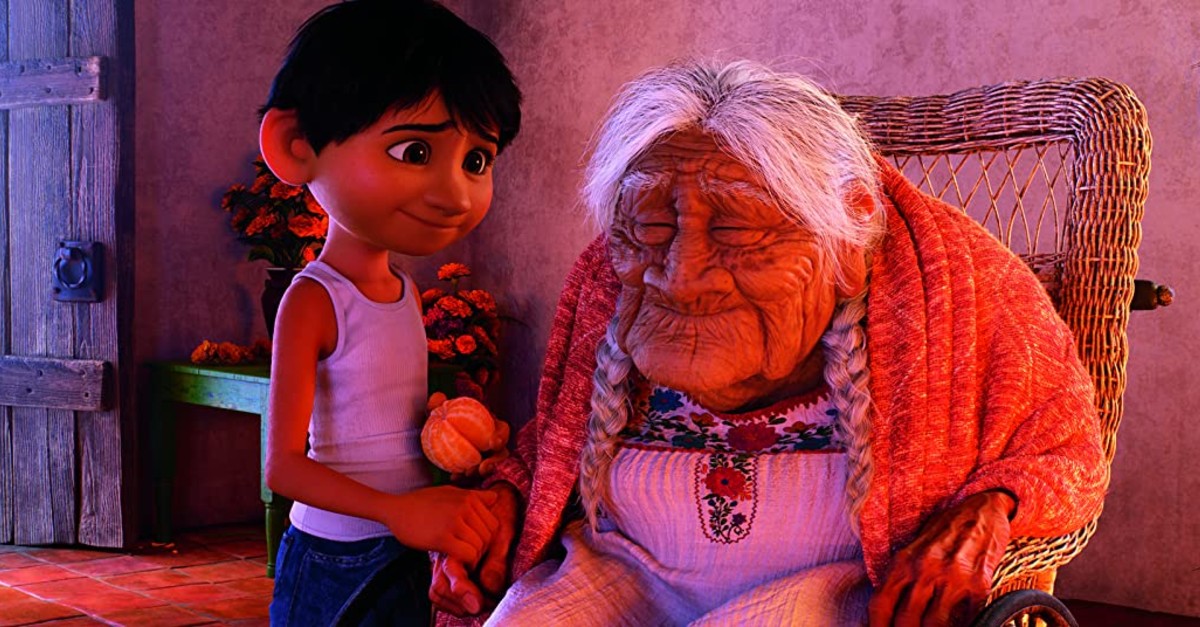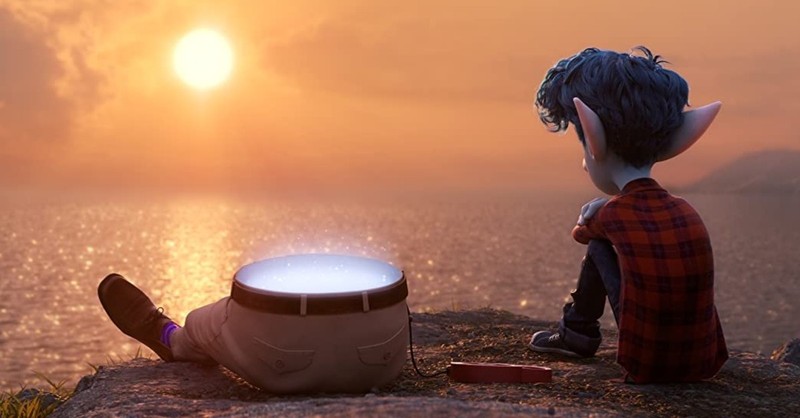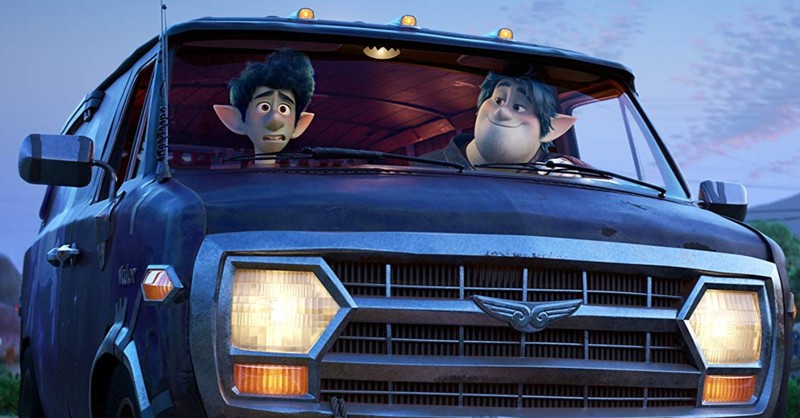
Ever since it released its first movie in 1995, Pixar has explored the deepest questions about humanity. Toy Story tackled the subject of change. A Bug’s Life examined fear. Up analyzed grief.
Pixar isn’t afraid of any subject, and it proved that by releasing two movies about death and the afterlife in 2020 -- the same year people were quarantined at home, questioning their purpose and pondering their mortality. Remember: It takes years to make such films.
Some would call that a coincidence. I’d call it providential.
In Soul (2020), a middle-aged man dies unexpectedly and enters the afterlife.
In Onward (2020), two teenage brothers set out on a magical quest to spend one more day with their late father.
Soul and Onward weren’t the first Pixar films to explore death. In 2017’s Coco, a young boy meets his ancestors on the Day of the Dead, a Mexican holiday.
Thus, three of the past five Pixar movies have explored eternal subjects rarely included in children’s films--much less in movies aimed at adults.
True, they aren’t faith-based movies.
But it would be foolish to ignore the biblical themes they’re promoting, even if the plots stray a bit from Scripture.
Here are 4 biblical lessons about life, death and the afterlife you’ll find in Pixar’s latest films:
Photo Credit: ©Pixar
1. Eventually, You Will Die

We know death is unavoidable. But we do our best to avoid the subject. We jump from distraction to distraction with an endless strand of social sedatives -- sports, music, movies, hobbies and social media. Like the old Simon and Garfunkel song from 1966, we “continue to continue to pretend” our “life will never end.”
Give Pixar credit for forcing us to contemplate death.
In Coco, a Mexican family celebrates their deceased relatives. (More on that in a moment.) In Onward, two teen elfs mourn the loss of their late father.
Soul makes mortality the central theme. In fact, it has one of the more jarring -- albeit kid-friendly -- death scenes ever recorded in a film. In one second, our hero, Joe Gardner, is walking away from a jazz band tryout, ecstatic that he’s set to play a nighttime gig alongside one of his musical heroes. (“I did it!” he says excitedly to strangers as he crosses the street.) A second later, he steps in a manhole and dies, immediately traveling to the afterlife. (“I’m not supposed to be here!” he tells someone.)
Soul sprinkles comedy into the plot, but the lesson is unmistakable: Death is unpredictable. It even can be sudden. It’s also the destination for every single person on the planet.
As James 4:14 says, we are a “mist that appears for a little time and then vanishes.”
Perhaps we should live each day with purpose and with an eternal focus -- as if death really is just around the corner.
Photo Credit: ©Pixar
2. There Is a Spiritual Realm

Pixar’s movies don’t replicate Christian theology about the afterlife. In fact, a few of the plots -- viewed through a biblical lens -- are nonsense. (There is no after-life do-over as we see in Soul, and the Day of the Dead celebration in Coco has no scriptural foundation.)
But that doesn’t mean these films get everything wrong. Soul and Coco teach that there’s more to life than this physical world. In Soul, we actually see Joe’s soul -- and the souls of thousands of others, too. In Coco, we see the spirits of 12-year-old Miguel’s deceased relatives (depicted as skeletons).
Thus, two of the most popular films in Pixar history convey a core biblical truth: There’s something on the other side of this earthly, physical realm. We’re more than cells, muscle and bone -- despite what the naturalists in academia tell us. You have a soul. In Soul, we even hear a brief discussion about hell. How many Hollywood films do that?
These movies reflect our natural yearnings for something eternal. They reflect our hope that there’s more to this life than this life. The things of this world will never bring true joy because, as Ecclesiastes 3:11 tells us, God “has planted eternity in the human heart.” The things of this world won’t satisfy us because they can’t. We were created for something greater.
Photo Credit: ©Pixar
3. Blessings Are All Around Us

It’s easy to get caught up in the “rat race” and go through the motions each day, failing to appreciate -- much less give thanks for -- the blessings in life.
In Soul, 46-year-old Joe shouts to anyone in heaven who will listen: “My life just started!” For Joe, a life without a successful career isn’t a life worth living at all. It isn’t until he meets a young soul (No. 22) that he fully appreciates the simple blessings he had overlooked: a beautiful blue sky, a peaceful walk on a cool day, and a mother who loves him unconditionally.
And when he finally reaches his career goal toward the end of the film, he realizes it doesn't bring the satisfaction he envisioned.
In Onward, young Ian Lightfoot can only think about what he never had (a father). It isn’t until the end of the movie that he focuses on the blessings he does have: a loving mother and older brother who helped fill the gap in his life, every single day, since he was a baby.
For many of us, their story is our story. God has surrounded us with priceless blessings, yet we fail to enjoy life because we’re too distracted. We’ve forgotten how to live life. We’re like the little fish who asked the big fish, “Where’s the ocean?” The little fish was swimming in it. Often, we’re chasing something we already have.
The Bible tells us that “every good and perfect gift is from above” (James 1:17). But like the nine lepers who were healed by Jesus and never returned, we rarely stop and give thanks (Luke 17).
Of course, these films don’t tell the whole, biblical picture about identity and purpose. Our identity and purpose isn’t found in a career or accomplishments or what we wish we had. It’s found in Christ.
Photo Credit: ©Pixar
4. Life Is Full of Second Chances

There’s a reason we are attracted to redemptive stories like Soul, Onward and Coco. It’s because we ourselves are part of the greatest redemptive story ever told: the story of Christ.
In Onward, Ian finds peace in his loss as he grows closer to his family (and his new step-dad). In Coco, Miguel is reconciled to his great-great-grandmother, who embraces his musical skill after initially rejecting it. In Soul, Joe recalibrates his focus on life and learns to be content.
We resonate with stories about second chances because we ourselves need second chances. When we watch a movie about loss, grief and redemption, we are watching our own story on the big screen.
The good news is we serve an infinitely loving God who is full of grace and mercy. He is “faithful and just to forgive us our sins” if we only trust Him (1 John 1:9). He is the God of second chances.
No doubt, Pixar movies aren’t a substitute for Scripture. And even when they tackle the big subjects, it’s an incomplete picture.
Still, it’s nice when a popular movie with ties to McDonald’s Happy Meals sparks a nationwide discussion about eternal matters. In the past, it may have been difficult to start a conversation about death and heaven with your neighbors.
But thanks to Pixar, it’s now a bit easier.
Photo Credit: ©Pixar